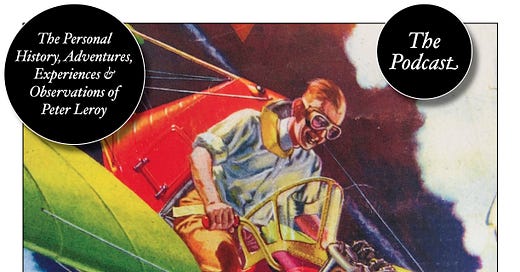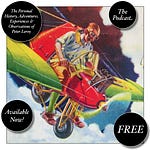3
In Which Herb Is Born to the Pipers of Boston
MY GRANDFATHER, Herb Piper, was born in Boston, into a family that was broke. For generations, the Pipers had exhibited two outstanding characteristics: a cool-headed talent for selling and a gullible ineptitude for investing. It was quite possible for a Piper to accumulate a tidy nest egg over the course of a week of selling and lose it in an hour by buying into a scheme that he thought would double his money overnight — a land deal, say, that he had overheard two fellows talking about downtown while he was having lunch, a deal that, he allowed himself to be convinced, involved virtually no risk whatsoever, a deal that was as sure as sure can be. Like a dog biting its own tail, a Piper at his worst turned his talent against himself, selling himself on the wisdom of his folly. This type of self-deception, self-injury, has been known in my family for generations as “doing a foolish Piper thing.” When imprudent Pipers found that they had done a foolish Piper thing, when the land, the development company, and the two fellows vanished, some Pipers would brood and curse themselves and the foolish Piper giant who seemed to dog their steps, but others would shrug and chuckle at themselves and their inherited folly. Herb’s grandfather was of the chuckling type. “Well,” he had said when he broke the news about the land, the development company, and the two vanishing fellows to Herb’s grandmother, “I’ve gone and done a foolish Piper thing, haven’t I?”
Once, however, there had been a substantial Piper fortune, thanks to Herb’s great-grandfather, Thomas Piper, and his association with Frederick Lewis Tudor, the finest flower ever to blossom on the vine of American marketing genius. In his essay “The American Drummer,” Wilhelm Huber wrote, “I am among those who hold that a genius for selling, that curious alliance of art, ingenuity, inspiration, cupidity, and fraud, is the American genius.” Certainly it was a genius for selling that made the United States, for a while at any rate, the commercial giant of the world, indeed the model for what a commercial giant might be. Just what was the nature of that genius that made America a great commercial nation, that genius that was so pronounced in Frederick Lewis Tudor and in the Piper family? Edward Huxtable has attempted to describe it, in The Person in Your Mirror Is You:
The inept salesman or saleswoman has the wrong mental image of himself or herself and his or her product, something like a huckster at a sideshow in a traveling circus might have: he or she feels that what he or she sells is inferior, an embarrassment. He or she imagines that he or she could be a much better huckster if the fat lady were fatter, the rubber man more limber, the dog-boy more slavering. But the best huckster, the genius huckster, begins by selling him- or herself on the merits of his or her commodity and so finds it not merely easy but intellectually satisfying, even morally gratifying, to persuade the rubes or inform the consumers that slim fat ladies are the rage, arthritic rubber men the rarest, dry-mouthed dog-boys the marvel of the age. The natural genius salesperson, whether he or she peddles books, cars, furniture, jewelry, pocket calculators, or investment schemes, is a carrier of his or her own infectious self-deception.
In Topical Guide 255, Mark Dorset considers Real Places: Boston, Late Nineteenth Century; Salesmanship; Traits, Generational Persistence of and Real People and Historical Figures from this episode.
Have you missed an episode or two or several?
You can begin reading at the beginning or you can catch up by visiting the archive or consulting the index to the Topical Guide.
You can listen to the episodes on the Personal History podcast. Begin at the beginning or scroll through the episodes to find what you’ve missed.
You can ensure that you never miss a future issue by getting a free subscription. (You can help support the work by choosing a paid subscription instead.)
At Apple Books you can download free eBooks of “My Mother Takes a Tumble,” “Do Clams Bite?,” “Life on the Bolotomy,” “The Static of the Spheres,” “The Fox and the Clam,” “The Girl with the White Fur Muff,” “Take the Long Way Home,” “Call Me Larry,” and “The Young Tars,” the nine novellas in Little Follies, and Little Follies itself, which will give you all the novellas in one handy package.
You’ll find an overview of the entire work in An Introduction to The Personal History, Adventures, Experiences & Observations of Peter Leroy. It’s a pdf document.














Share this post